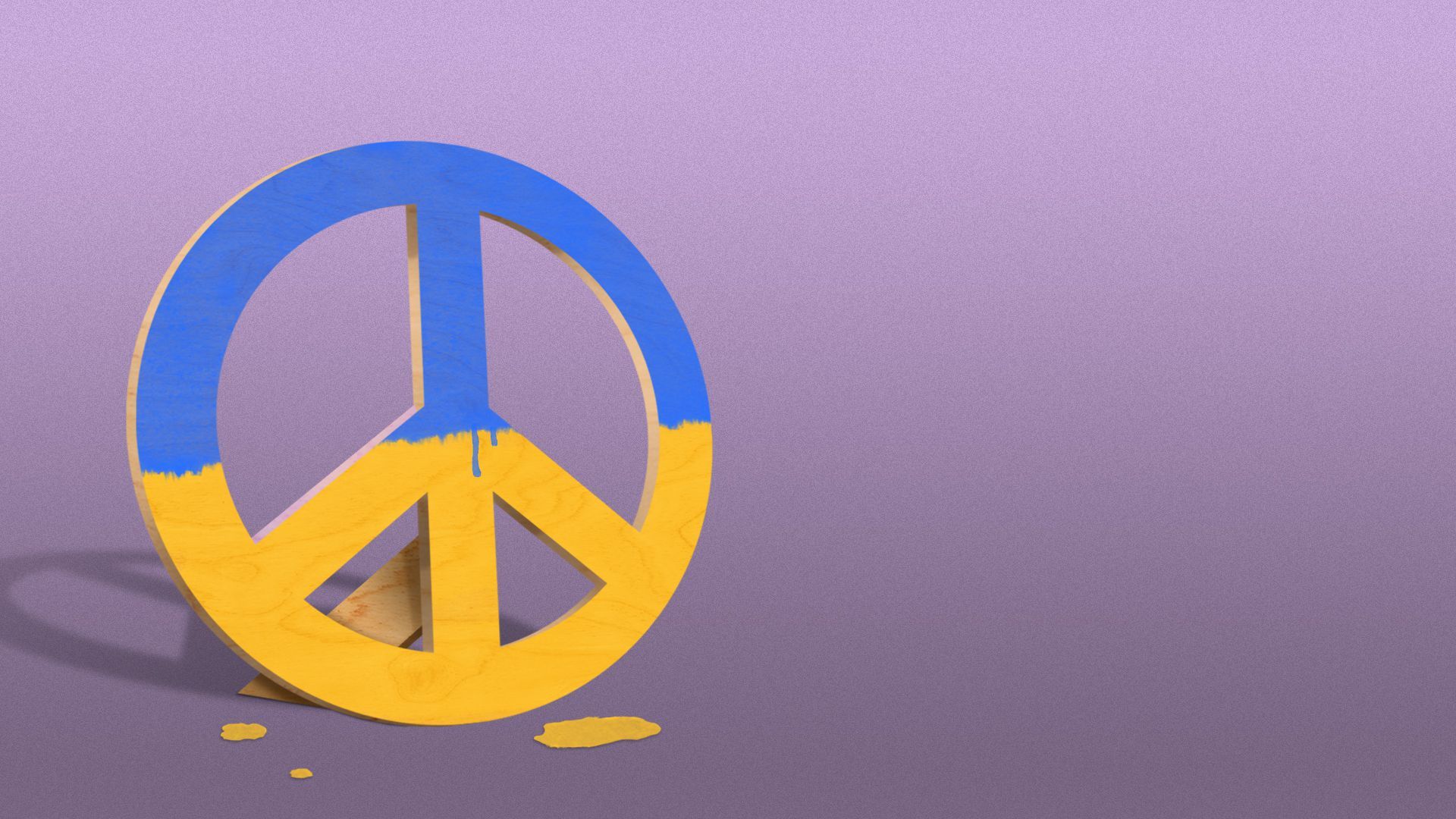Ukraine's push for substance with symbolism
Add Axios as your preferred source to
see more of our stories on Google.

Illustration: Sarah Grillo/Axios
Worldwide expressions of support for Ukraine have offered a symbolic boost to a besieged nation, but its leaders are seeking even more of the substantive support that's been slowed by logistical and timing hurdles.
Why it matters: Ukrainians are viewing the survival of some cities in terms of hours or days. While missiles are arriving in Ukraine and crushing sanctions are being felt in Moscow, neither is stopping the invasion as quickly as would Western air support, for example.
The big picture: A number of countries have promised aid to Ukraine to help repel the invasion, but the strongest declarations from the West and elsewhere are yet to fully materialize — if at all.
- The U.N. General Assembly voted 141-5 to demand Russian President Vladimir Putin to withdraw forces, but there's no mechanism for enforcement.
- The European Union promised to send fighter jets, but that never happened after three nations with Russian-made aircraft refused.
- Around 20 countries — mostly NATO and EU members — have pledged to send weapons, but the arms have been slow to reach Ukraine and it's unclear whether they'll arrive on the battlefield in time to make a difference.
In the United States, the symbolic gestures — and supportive talk — also have outpaced congressional action.
- First lady Jill Biden hosted Ukraine's ambassador to the United States at the State of the Union address, and many senators and representatives wore Ukrainian blue and yellow in solidarity.
- Congress left for the weekend, though, without passing a multibillion-dollar aid package.
- “The strongest signal we can send to [Russian President] Vladimir Putin right now is the United States stands together, together, with the people of Ukraine,” Senate Majority Leader Chuck Schumer said Wednesday.
Alexander Vindman, a Ukraine-born, retired Army officer and former National Security Council director, called for $35 billion in aid for reconstruction — what others have dubbed "a Marshall Plan for Ukraine."
- Vindman said the U.S. can look to its support of the Afghan mujahideen in the 1980s as an example. "This has happened before. We just forgot the lessons."
What they're saying: "We need more — and please, stop telling us military aid is on the way," Andriy Yermak, the head of the Ukraine's Presidential Office, wrote this week in a New York Times op-ed. "We need antitank and antiaircraft weapons and other ammunition delivered to our brave soldiers right now."
- While the US and NATO have all but ruled out a no-fly zone, Ukrainian President Volodymyr Zelensky, prominent Ukrainian advocates and Ukrainians around the world continue to call for it.
- "If you can't close the sky now, ... tell me how many people have to explode, how many arms, legs, heads have to fly to reach you?" Zelensky said Thursday during a news conference in Kyiv.
- Andrew Lohsen, a fellow in the Europe, Russia and Eurasia Program at the Center for Strategic and International Studies (CSIS), said: "It's a kind of visceral reaction to want more to demonstrate that level of Western support more than just rhetoric, or in financial and economic sanctions that don't really address the Russian military operation directly."
Between the lines: The Ukrainian military has received 1,000 Javelin anti-tank and 500 Stinger ground-to-air missiles from Germany.
- While acknowledging the challenges of moving weapons into Ukraine, a senior U.S. Defense Department official said Tuesday, “We believe it is getting into the right hands, that they are actively using these systems."
- Estonia's Ministry of Defense also announced a second batch of Javelins it sent had reached Ukraine.
What's next: With pipelines finally established, expect promised aid to materialize as tangible goods massed on the Polish border. The challenge then will be getting the supplies into Ukraine.
